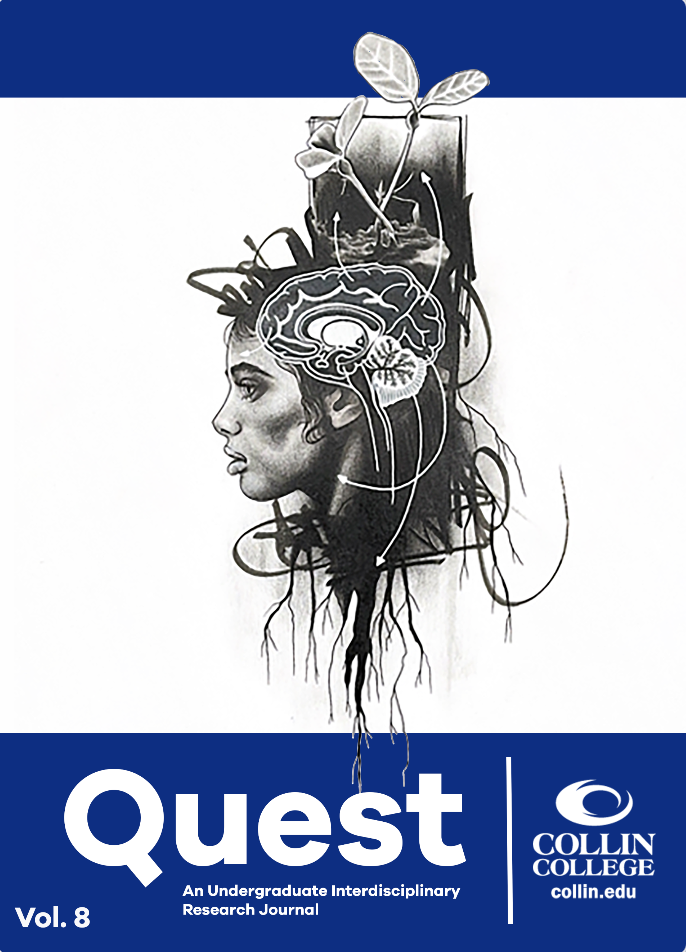Read Quest at Digital Commons
Quest: An Undergraduate Interdisciplinary Research Journal is a professional and mentor-reviewed journal showcasing research in process, best practices, and completed works from within the Collin College academic community.
Learn More About Quest
Collin College students and recent alumni are invited to submit research projects for publication.
Quest considers manuscripts and research artifacts including
→ traditional research-based essays
→ research-in-process assignments
→ multi-media research projects
→ performance-based research projects.
Quest challenges students and faculty mentors to engage new ideas in various disciplines while making it possible for students to present their research to a wide audience.
Quest cover artists are members of Collin College's Art Club. Discover their art and stories below.
Vol. 9
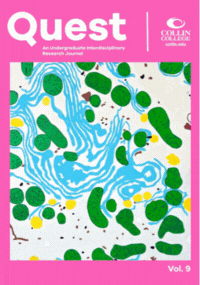
Artist: Kelly Perez
Title: Catalyst
Media: Acrylic
About: This series of paintings explores how small elements can ignite significant transformations in life and nature. The series uses cellular imagery to represent key aspects of existence.
Vol. 8
Artist: Randy Dehoyos
Title: “Growing” (2024)
Media: Mixed media on paper
About:
Growing,
From the cherished moments you are introduced to the world, moving forward with and within time, growing. To acquiring and obtaining new knowledge, reaching in and out simultaneously, becoming rooted in yourself, becoming. From child to adult, from sprout to flowering, maturing.
Growing.
Vol. 7
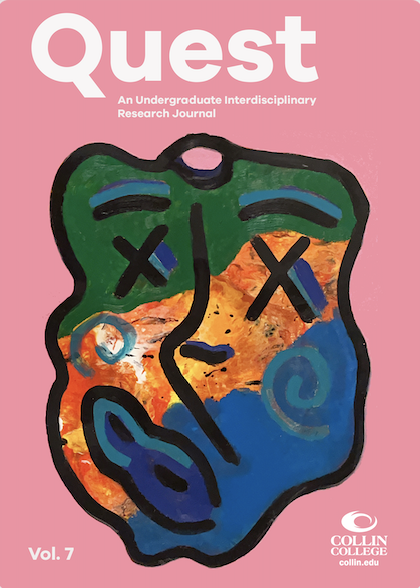
Artist: Evan Dozier
Title: “I don’t remember, either”
Media: 16x20” oil on canvas
About: After viewing the newly acquired Jean-Michel Basquiat painting “Sam F” hung strategically next to a Picasso at the Dallas Museum of Art, I was thinking about the role of portraiture and how it can convey multiple juxtaposing messages to a viewer. This work was an intuitive response to portraits that question melancholy versus happiness.
Vol. 6
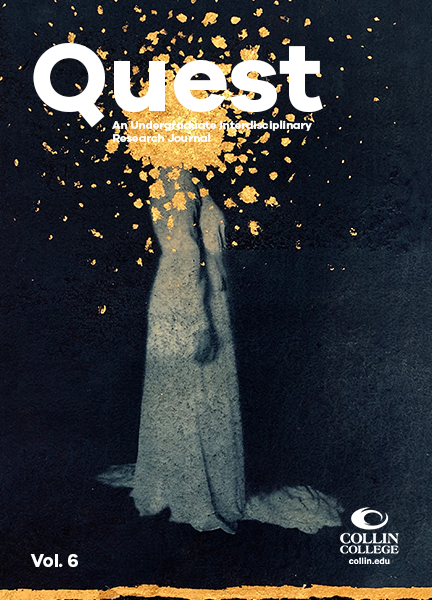
Artist: Abby Quillen
Title: "What do you see?"
Media: Altered Photo
About: Who do you see in the mirror? Can you see yourself clearly, or do catch a complete
stranger staring back at you? A figure, perhaps. The definition of “self” is a “person’s
essential being that distinguishes them from others.” Today we are bombarded with
“selfies” that pack a pristine jawline, lips, nose, eyes, and a tilt of the head into
one neat image. Amongst the thousands of discarded photos lie the pieces of a person,
the less curated moments that truly capture an individual's essence.
In photographic history, three incredibly powerful women showcased portraiture in
vastly different ways. Cindy Sherman focused on creating images based on a character
and she drastically changed her appearance into something unrecognizable, focusing
on details. This technique made her capable of showcasing many different versions
of herself as different people telling a story. Diane Arbus, known mostly for her
photographs of social outcasts, took portraits reflecting her essence in each image--clear
and raw. Vivian Maier hid amongst her work, often showing parts of her figure: a leg
here, a hand there. If you piece them all together, will you see her individuality?
While each of these women found her own style and technique, they all used self-portraiture
to tell compelling stories that captured a glimpse into their inner being. So, when
you look in the mirror, who do you see? Yourself, or just the pieces?
Vol. 5
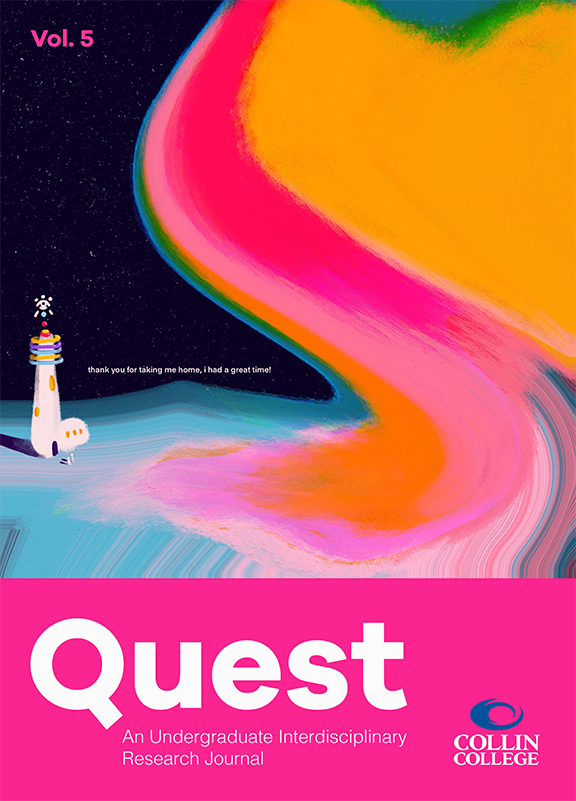
Artist: WOELOCK
Title: “Thank You for Taking Me Home, I Had a Great Time”
Media: Digital
About: WOELOCK is a pseudonym for a Collin College student studying the arts.
The work revolves around storytelling, world building, character development, violence, and humor.
You can find more works on Instagram searching WOELOCK.
I’m glad we went to that movie!
Yeah, it was nice! …The design of the ancients was cool. Very…fleshy.
That’s what I thought! I wonder how they thought of that. Being bound to a vessel like that must be so…frustrating.
Well, they likely had no idea we’d make it this far. They’re not another species, they’re the old us.
Yeah. They seem so foreign, like a myth or something.
Totally, totally…you wanna grab another movie next week?
Oh! Yeah, yes. That’d be awesome. (:
Great! (:
Thank you for taking me home, I had a great time!
Vol. 4
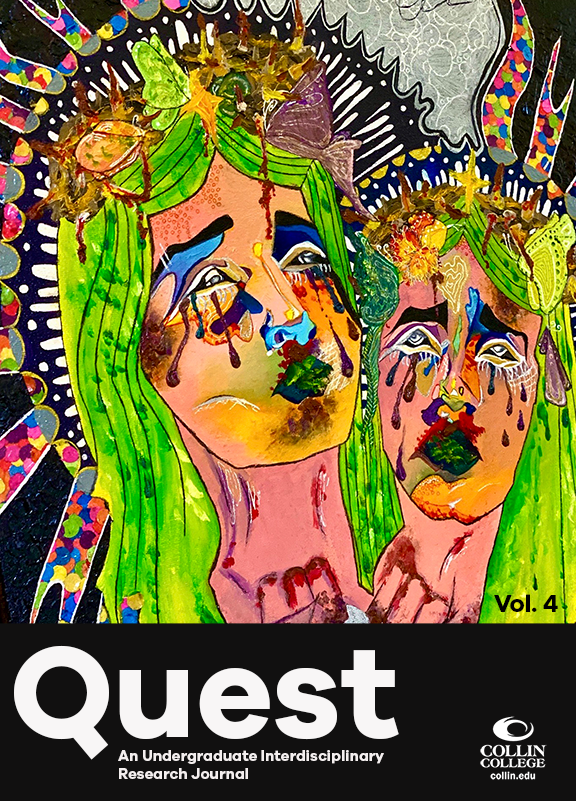
Artist: Kendrick Goodenough
Title: Acta Non Verba
Media: Mixed
16”x20”
2020
@kendrickquinnart
About: Acta Non Verba is a physical representation of internal revolution. The incantations we speak to ourselves as a means of self-preservation manifest here in immaterial items, fused together in an epitaph of ephemera that honors what once existed in the places we now stand. Religious imagery throughout art history has played the role of storyteller to communicate narratives that are bigger than the image. The reference for this work is based on a catholic sculpture of The Madonna; a figurehead that is recognizable beyond religion and becomes a visual depiction of the martyrdom we cast upon ourselves when we venture out of the blue and into the black. Traditional oil painting techniques merge with non-traditional materials such as confetti, multichromatic pigment mixtures, markers, sidewalk chalk, and metal sewing notions. The unknown and the unaware join hands to question change and the nonlinear progress that goes along with it.
QuestJournal@collin.edu




